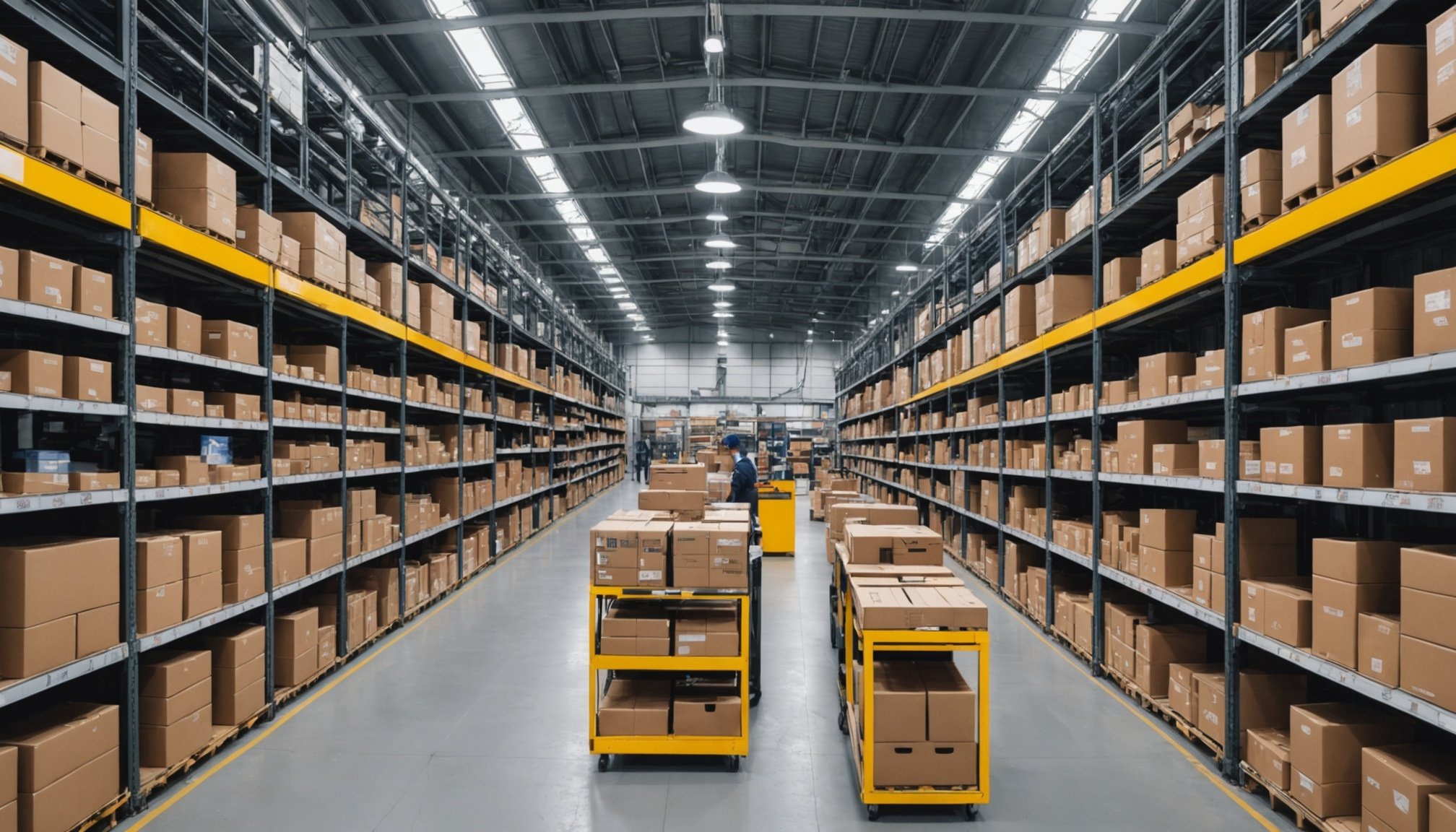Overview of AI in Retail Supply Chains
Artificial Intelligence (AI) has transformed retail supply chains by enhancing their efficiency and reliability. These advanced technologies include machine learning, robotics, and predictive analytics, providing a competitive edge in the dynamic UK retail market. AI innovations enable businesses to optimize inventory, forecast demand, and improve customer experiences.
In the realm of supply chain transformation, AI technologies define a new era. They enable retailers to automate processes, resulting in swifter and more efficient operations. For instance, machine learning algorithms can swiftly analyse large datasets, identifying patterns that inform stock replenishment. This meticulous analysis not only anticipates consumer demand but also prevents overstocking, reducing wastage and costs.
Also to see : Exploring the Future: How AI is Set to Transform Tax Compliance in the UK
The emphasis on operational effectiveness and efficiency in the UK retail sector underscores AI’s significance. Retailers are increasingly leveraging these technologies to enhance delivery systems and streamline logistics. This is crucial in a highly competitive market where quick response times can distinguish leading brands from their competitors.
Key developments in AI applications demonstrate substantial gains in supply chains. From enabling real-time tracking of shipments to automating routine tasks, AI ensures seamless operations. These advancements cement AI’s role as an indispensable part of retail strategies. Consequently, businesses are encouraged to adopt these technologies to navigate future challenges adeptly.
Also to see : Revamping mental health care in the uk: harnessing ai innovations for superior patient support
Benefits of AI Implementation in Retail Supply Chains
The integration of AI benefits into retail supply chains is paving the way for unparalleled efficiency and cost reduction. Automating routine tasks, AI solutions significantly decrease operational expenses, empowering retailers to allocate resources more strategically. By enabling predictive analytics, AI anticipates demand more accurately, reducing unnecessary stockpiling and cutting storage costs.
Logistics improvement is another critical advantage offered by AI. Enhanced route planning through AI-driven systems ensures quicker delivery times and minimises transportation costs. For instance, AI algorithms process real-time data to determine optimal shipping routes, thereby streamlining the entire distribution network.
Moreover, AI’s role in inventory management cannot be overstated. Through machine learning, AI predicts inventory levels, ensuring shelves are stocked efficiently. This prevents both overstocking and stockouts, preserving capital and enhancing customer satisfaction.
To illustrate the transformative impact of AI, consider the success of notable retail giants. Companies like Amazon and Walmart have utilised AI to bolster their supply chains, gaining a competitive edge. Their investments in AI tech underscore the strategic value of such innovations, driving both productivity and profitability.
AI implementation in retail isn’t just a trend; it’s a necessary evolution towards smarter, more agile supply chains.
Challenges in Integrating AI into Retail Supply Chains
In the realm of retail supply chains, AI challenges present significant hurdles that demand attention. These challenges often stem from integration hurdles such as the lack of infrastructure and data compatibility issues. Many retailers grapple with fragmented systems that resist seamless adoption of AI technologies.
Furthermore, cultural and structural obstacles pose barriers to effective AI integration. Traditional mindset and resistance to change within organisations can hinder technology adoption. Employees may fear automation will replace jobs, affecting morale and cooperation. Addressing these concerns requires strategic communication and training to ease transitions.
To surmount these challenges, industry insights propose several strategies. Firstly, fostering a culture of innovation is vital. Encouraging open discussions about AI benefits can alleviate trepidation. Emphasising the collaborative nature of AI, where technology enhances rather than replaces human effort, is crucial.
Secondly, phased implementation can alleviate integration hurdles. This involves gradually introducing AI solutions to ensure smooth technology adoption. By demonstrating incremental success, organisations can build confidence and support for more extensive deployment.
Finally, leveraging the expertise of AI specialists can facilitate smoother transitions. Their knowledge can guide retailers through integration hurdles, ensuring AI solutions are tailored to specific needs. This collaborative effort promotes efficient and effective integration of AI into retail supply chains.
Future Trends in AI for Retail Supply Chains
The future of retail is increasingly tied to the adoption and integration of cutting-edge AI trends. As emerging technologies continue to evolve, their implications for retail supply chains are profound. Industry experts anticipate several innovations in supply chains that could redefine how retail operates over the next decade.
One significant trend is the enhancement of supply chain efficiency through AI-driven predictive analytics. Retailers are leveraging these tools to forecast demand with greater precision, allowing them to optimise inventory management and reduce waste. Additionally, innovation in supply chains is expected to include the integration of autonomous delivery systems, such as drones and self-driving vehicles, which could revolutionise last-mile logistics.
Furthermore, the future of retail will likely see a rise in the use of AI to personalise customer experiences. By analysing consumer behaviour and preferences, retailers can offer tailored recommendations, creating a more engaging shopping experience.
Industry experts also predict that AI-powered tools will play a crucial role in enhancing sustainability in retail supply chains. By optimising resource consumption and reducing carbon footprints, AI can support environmentally conscious retail practices. Therefore, the future of retail is not just about technological advancement but also about aligning with broader societal goals.
Case Studies of Successful AI Integration
Exploring transformative applications of Artificial Intelligence (AI) in the retail space provides valuable insights into its potential. Examining AI case studies and success stories reveals innovative paths taken by industry leaders.
Company A’s Journey
Company A harnessed AI to enhance retail innovation, focusing on personalized customer experiences. By analysing consumer data, they tailored recommendations, increasing sales by 20%. AI-powered chatbots improved customer service, ensuring prompt assistance. This strategic AI integration solidified their market position, showcasing a model of successful AI adoption.
Company B’s Transformation
With an innovative take on AI, Company B utilised machine learning to forecast trends and optimise stock management. This strategic change resulted in reduced surplus inventory and increased profit margins. Implementing AI-driven checkout systems expedited transactions, elevating customer satisfaction levels, and proving the importance of innovative solutions and quantifiable success metrics.
Industry Comparison
Comparing different approaches, Company A focused primarily on enhancing customer relations, whereas Company B aimed to streamline logistic operations. Both executed distinct strategies, garnering impressive results, yet Company B’s focus on operational efficiency marked a shift towards infrastructural innovation within retail. This comparative analysis invites other companies to consider tailored AI strategies for optimal outcomes.
Best Practices in Leveraging AI for Supply Chain Efficiency
In today’s competitive environment, AI best practices are essential for achieving operational excellence. For retailers, enhancing supply chain processes with AI requires diligent strategy development. Start by understanding your unique business needs and challenges, as this will inform the creation of an effective AI strategy. It’s important to seek expert insights and foster a culture of innovation and collaboration among your teams.
Data quality and infrastructure play a critical role in the success of AI projects. High-quality data is the foundation upon which AI systems deliver insights and drive retail efficiency. Invest in robust data management systems to ensure accuracy, reliability, and scalability. Infrastructure must support seamless data integration and maintain strong cybersecurity practices to safeguard sensitive information.
Continuous improvement and adaptation are crucial in AI applications. Encourage a mindset of evolution where feedback and data analysis guide enhancements. Monitor AI systems regularly, making necessary adjustments to optimize performance. Staying updated with technological advancements ensures your AI tools remain competitive and effective. As AI continues to evolve, its adaptability will be a powerful ally in driving efficiency within your operations. By embracing these best practices, businesses can harness AI’s full potential, achieving sustainable operational excellence.










